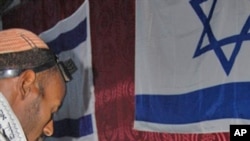The final remnants of a community of Ethiopian Jews are asking Israel to make good on a promise to allow them to immigrate. The so-called Falash Mura Jews accuse Israeli authorities of turning a deaf ear to their immigration requests.
Their synagogue is a plastic tent with a dirt floor behind a wall in a busy Addis Ababa neighborhood. Their rituals and dress are strikingly similar to those of the local Christian community.
But members of this impoverished Jewish congregation claim to be direct descendants of Ethiopia's King Menelik I, who is believed to have been the son of Israel's King Solomon and the queen of Sheba.
Tens of thousands of Falash Mura were airlifted to Israel in two waves in the 1980s and 90s, after the Chief Rabbinate ruled they were historically Jews who had been forced to convert to Christianity. The Jewish state is currently home to an Ethiopian community of more than 100,000.
But at least 8,000 more say they are also eligible for Israeli citizenship. Twenty-five-year old Misganaw Yeshiwas came to Addis Ababa 11 years ago from rural northern Ethiopia in hopes of joining relatives in Israel. He says the Israeli embassy has turned a deaf ear to his plea to be reunited with his family. "We starting the process in Israel embassy. They interview us, I interview three times, in Israel embassy, but I didn't go in Israel. I don't know why. My mother, my brother, my sisters live in Israel," he said.
The leader of Addis Ababa's Falash Mura community, Sisay Berhan says many of those left behind are dying of tuberculosis and malnutrition. Several women in the congregation showed visiting foreign reporters photographs of loved ones who have died while waiting to be reunited with family members in Israel.
But the Falash Mura pose an awkward question for Israel. Public opinion is said to be divided between those who favor allowing them to immigrate, either because they were Jews by ancestry, or for humanitarian reasons, and others who argue they are simply claiming to be Jewish to escape Ethiopia's grinding poverty.
Several attempts to reach the Israeli embassy in Addis Ababa for comment Tuesday were unsuccessful.
The Jerusalem Post newspaper Monday quoted Israel's Interior Minister Eli Yishai saying he would soon send a team to check the eligibility of 8,700 Falash Mura Jews. But the report said members of Israel's Ethiopian community had "voiced cynicism" at Yishai's promises.
The newspaper also reported some members of the Israeli Knesset had expressed frustration at the government's apparent intransigence on the Falash Mura issue. One lawmaker, Shlomo Molla, was quoted as saying, "it seems there is a clear policy not to bring more Jews from Ethiopia, and no one is willing to explain why."
Ethiopian Jews Push Israel on Immigration Right




